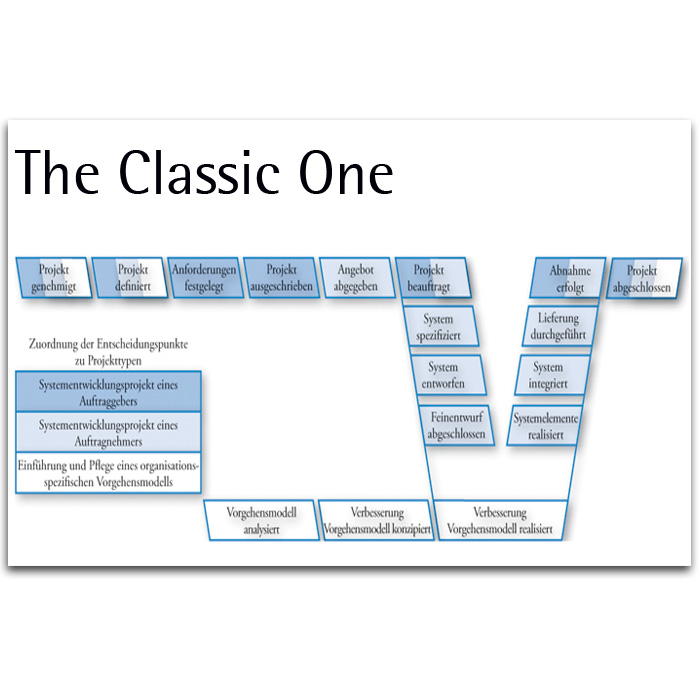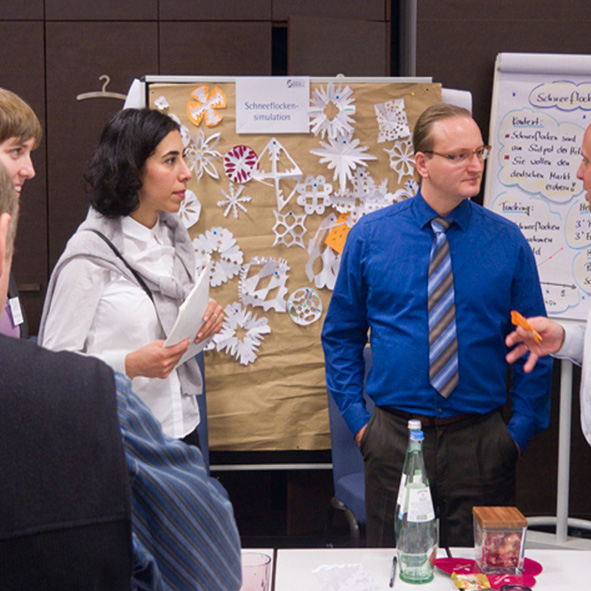Getting a grip on the complexities of the development process requires a planning- and process model to be in place. For that, the common distinction is that between classic and agile process models.
Generally, a process model subdivides the development process into clearly assessable phases, limited both in terms of duration and content, and organizes the individual development steps. These steps are subsequently matched with methods and techniques. Throughout the entire development process, the goal is to bring related tasks and process models into a clear logical order. With its specifications, a process model serves as an organizational tool, which is later on adapted for a specific project through tailoring.

As “classic process models” we understand detailed approaches which provide the project members with precise working instructions. Classic process models differ from agile process models by being “static” and setting particularly specific guidelines as to when and how artifacts are to be created. The two best-known “classics” are probably the V-model XT, an agency-specific, process-oriented standard for planning and executing projects, e.g. system development, and RUP®. RUP® (Rational Unified Process) was developed by the company Rational and is a method-dependent process model that is closely connected to UML. First developed in 1997, the standard has since been continuously updated and improved.
Requirements Engineering (RE) is an integral part of every classic process model. Its goal is to define all requirements as completely as possible within the initial phase of a project. This is intended to provide the best-possible basis for all subsequent phases. Since this is difficult to achieve at times, revisions (Rücksprünge) are a constant possibility. Nevertheless, it remains an essential goal of the analysis phase. Consequently, the formulation of a set of high-quality requirements usually entails a great deal (Umfang) of elicitation, documentation and validation techniques of Requirements Engineering.


Regardless of whether you want to introduce requirements engineering within an existing process model or a complete process model yourself, you need a well thought-out, comprehensive change management (change strategy). Within this strategy, it must be defined, among other things, which people are to accompany or drive the change, what internal marketing is to look like, how new knowledge/methods are to be communicated to the various teams, how they are to monitor the current state of the introduction, etc. Many small individual building blocks that all have to be fulfilled in order to make the change within an organization successful. The most important thing, however, is: An implementation project is not a sprint, but a marathon that must be endured!
If you have any questions to the consulting and project work of SOPHIST, we are at your disposal: from the organization and preparation to implementation and follow-up. We will be happy to help you.
Copyright 2018
Do you need more information?
Just give us a Call and let us direct you to the right contact person?
Tel: +49 (0)9 11 40 90 00
E-Mail: heureka[at]sophist[dot]de
Our office hours: Monday to Thursday: Friday:
08:00 - 12:00 Uhr 08:00 - 12:00 Uhr
13:00 - 18:00 Uhr 13:00 - 17:00 Uhr
Of course you are also welcome to reach various departments directly by e-mail:
All about trainings, projects or consulting activities:
All about our job offers and your career opportunities at SOPHIST:
DeineZukunft[at]sophist[dot]de
All about our events, marketing activities and publications:
You might also be interested in these topics: